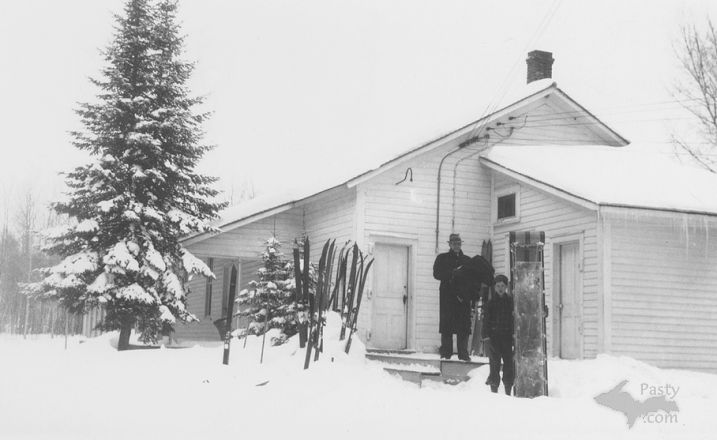By Charlie at Pasty Central (Chopper) on Sunday, April 17, 2011 - 07:58 am:
If it's not snowing where you live, rest assured it's snowing here in the U.P. this morning. The first picture fits in perfectly.
As we have been exploring some of the history of Lake Michigamme this month, I ran across a couple of Shoebox Memories from Jan Dalquist about Presbytery Point, one of several Camps on the lake, that mainly operates in the Summer. But early in the Camp's history, a youth group from Iron Mountain skied across the lake to celebrate the New Year at Fellowship Lodge. Seen in the top photo, the Lodge marked its 100th anniversary last year, although the camp itself was not founded until 1937. The couple in the second picture is Rev. N. U. and Beulah McConaughy from Iron Mountain, who directed the Junior Boys' and Girls' camps into the late 1950's. Jan provides this sketch of the history of Camps in the U.P.:
Summer camps in Upper Michigan have a history of almost 100 years. The national camp movement began during the late nineteenth and early twentieth centuries. Founded in 1861 near Milford, Connecticut, the Gunnery Camp is believed to be the first, followed by the YWCA and YMCA camps in 1874 and 1885. Both the American Camping Association and the Boy Scouts of American started camps in 1910. During the 1930's the National Park Service initiated a series of Recreation Demonstration Areas which developed camp facilities for rental by various groups.
Upper Peninsula church denominations joined the movement by founding camps of their own for their youth. The oldest camps in the UP are Presbytery Point on Lake Michigamme, founded in 1937 by the Presbyterian Church, USA.; Fortune Lake Camp, near Iron River, founded by the Lutherans and Gitche Gumee in Eagle River, both founded in 1930; Covenant Point Bible Camp on Hagerman Lake Near Iron River founded in 1926 by the Evangelical Covenant Church; and the oldest, the Michigamme Institute on Lake Michigamme, founded in 1922 by the United Methodists.
Many young people had their lives greatly impacted by those early summer camp experiences– days without all the electronic gadgetry which is now available. As the national culture has changed from those early years, so have church camp programs which have had to compete with basketball, hockey, football, computer and a myriad of other program-specific camps. But the church camps do survive, and offer a different type of community living and experience for those who attend.
Janet has written a book on Presbytery Point that includes a CD of 335 photos spanning the 70+ year history of the camp. You can find it at the 




